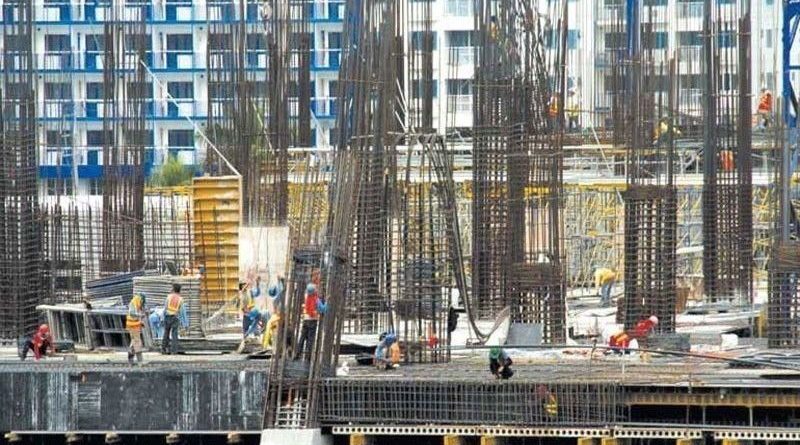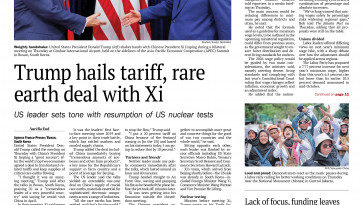BIZ: MANILA- Task Force approves safety guidelines for construction work
These include requiring workers to stay in designated quarters for the entire duration of the project, limiting persons who may enter construction sites, and the strict monitoring of the workers’ health conditions- STAR/File

MANILA, Philippines — The government has approved the safety guidelines for implementing infrastructure projects in areas under enhanced or general community quarantine (ECQ/GCQ).
These include requiring workers to stay in designated quarters for the entire duration of the project, limiting persons who may enter construction sites, and the strict monitoring of the workers’ health conditions.
During yesterday’s “Laging Handa” virtual public briefing, the Civil Service Commission (CSC) also directed government agencies to adopt appropriate alternative work arrangements or AWA for employees in preparation for the anticipated easing of quarantine
rules in several areas after May 15.
CSC commissioner Aileen Lizada said the agencies could adopt any or a combination of the four AWA types—work-from-home, skeleton workforce, four-day or compressed workweek, and staggered working hours.
She added that work-from-home arrangement should be adopted in areas still under ECQ or even in the GCQ areas with limited public transportation.
The agencies—especially those providing health and emergency frontline services, border control, and other critical services as identified in the IATF Omnibus Guidelines on Community Quarantine—could also adopt the skeleton workforce arrangement.
For offices that have work shifts or flexible working time, the CSC said the staggered working hours scheme might be more appropriate. Other agencies could also go for the compressed workweek where employees will only work four days each week.
Sen. Cynthia Villar said she supports the proposal to place parts of Metro Manila that have low or moderate risk in terms of the number of COVID cases under GCQ after May 15.
“I agree that we should start reopening the economy and begin the implementation of new normal measures in Metro Manila areas that have been successful in keeping their COVID-19 cases under control,” Villar added.
?In the guidelines released days after the government’s task force on the coronavirus pandemic allowed public and essential private construction work and infrastructure projects in ECQ and GCQ areas, construction firms are required to conduct an inventory of works for the construction sequencing that will be followed to maintain social distancing, stagger the break times to prevent crowding and for employees to stay in their quarters for the entire duration of the project.


If there are no available quarters, the “prior to deployment” procedures have to be conducted at every instance of reentry of people.
Errands to be conducted outside the construction site should be kept to a minimum and supervisors should ensure that the number of personnel running errands would be limited, are properly disinfected and closely monitored for symptoms within 14 days upon re-entry. Field offices, employees’ quarters, and other common areas should be regularly disinfected. The concessionaires, contractors, subcontractors and suppliers should provide in–house personnel adequate food, safe and potable drinking water, disinfectants and hand soap.


A safety officer should strictly monitor work activities to ensure compliance with safety standards and quarantine protocols.
The workers’ health condition should be monitored daily. Personnel with coronavirus symptoms should go through a 14-day quarantine or brought to the nearest treatment facility, if necessary.
?For government construction projects, engineers from the public works department should ensure strict compliance with the wearing of additional personal protective equipment. Contractors of essential private construction projects under general community quarantine must assign a safety officer to ensure that social distancing measures are observed. Off-site employees should be provided with quarters and transport services that are disinfected regularly. Sharing of construction and office equipment is discouraged. If this cannot be avoided, the shared equipment must be disinfected in between transfers among personnel.


All material and equipment delivery and disposal should be conducted by a specific team of personnel on an isolated loading and unloading zone and shall be duly disinfected. Non-essential personnel will not be allowed to enter the construction site, employees’ quarters and field offices. All personnel entering the construction site on a temporary basis should be properly logged and checked for coronavirus symptoms. Gatherings, liquor, or merry–making are strictly prohibited within the construction site. Managers should see to it that clustered and staggered deployment of employees within the construction site is observed. They should also ensure that there is proper disposal of infectious waste such as PPE and other byproducts. – Elizabeth Marcelo, Cecille Suerte Felipe, Emmanuel Tupas, Rainier Allan Ronda, Louella Desiderio
Alexis Romero (The Philippine Star


SIGN UP TO RECEIVE OUR EMAIL
.
The most important news of the day about the ASEAN Countries and the world in one email: [email protected]
6.19.2020












